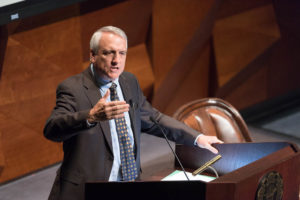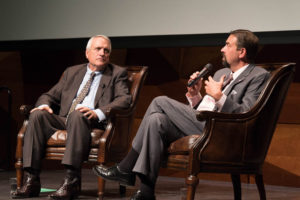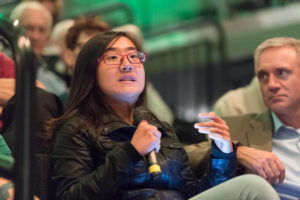Watch the full lecture above.
Before he was governor of Colorado, Bill Ritter was a prosecutor and a district attorney. Energy policy wasn’t necessarily “in his DNA,” he said.
But for Ritter, who delivered the President’s Community Lecture Nov. 7, transitioning to a clean energy future is as much about justice as it is about robust technology, smart policy and everything in between.

The director of Colorado State University’s Center for the New Energy Economy, Ritter hasn’t skipped a beat since leaving political office in 2011, offering his experience and insight to advising all levels of government on renewable energy. He described those efforts during the lecture, which was followed by a question-and-answer session hosted by CSU President Tony Frank. Ritter also signed copies of his new book, “Powering Forward,” which covers his time in office and his evolving leadership in clean energy.
“Think about this with me for a moment,” Ritter said. “The United States of America has contributed more greenhouse gases into the atmosphere than any other country by volume … but who’s it having an impact on?”
Hundreds of millions of people around the globe are directly affected by climate change, due to rising tides and increasingly arid farmland, Ritter said. America must lead an energy revolution, not just for its own sake, but for the sake of justice – an obligation to a planet paying a steep price for the energy-intensive excesses of many generations.
Colorado as a leader
While in office, Ritter signed 57 clean-energy bills, and positioned Colorado as a leader in clean tech and transitioning away from fossil fuels. He got right back to work after leaving office, founding the Center for the New Energy Economy at CSU. There, he leads a team of people working closely with research scientists, industry partners and government officials to develop and advise energy policies that advance society and improve the condition of humankind, he said. What’s more, the center is part of the university’s Energy Institute, a nexus of science, industry and policy experts all working together to improve the energy landscape for all.

While in office, Ritter said, he witnessed firsthand how national energy policy was stymied by politics. When he started the Center for the New Energy Economy, he chose to focus on working with states, addressing all of the “E’s:” energy, economic development, environmental issues, as well as equity – that is, for ratepayers and lower-income people.
Rising above politics
Above all, Ritter wished to transcend politics, believing that addressing climate change and supporting renewable energy policy could be done while rising above partisan interests. For example, in an effort to “convene the West” in the context of state-level implementation of the EPA Clean Power Plan, Ritter reached across the aisle to gather insights from eight Republican and five Democratic governors.
That conversation was constructive, he said. And perhaps it was because Ritter had also governed, and knew firsthand what these governors faced: the complex needs of their constituents, and economic stressors like a steep decline in coal.
“At the end of the day, there is a way for us to work together, and our work on the Clean Power Plan helped us really determine that,” Ritter said.

The Center for the New Energy Economy is also in the business of tracking state-level legislation. The newly launched SPOT for Clean Energy website is a hub of information on which states are doing what to drive a clean-energy agenda.
From his participation in the historic Conference on Parties in Paris, where nearly 200 countries signed a climate change-mitigation agreement, to his continued work on convening leaders of all political stripes toward common ground, Ritter isn’t stopping anytime soon.
And it’s no accident he’s doing it all at CSU, his alma mater, which he is “proud beyond words” to be a part of.
“I have a lifetime of rich experiences where I can draw a straight line from Colorado State University to the opportunities that I have been afforded, including serving as Colorado’s governor, and now, as the director of the Center for the New Energy Economy.”